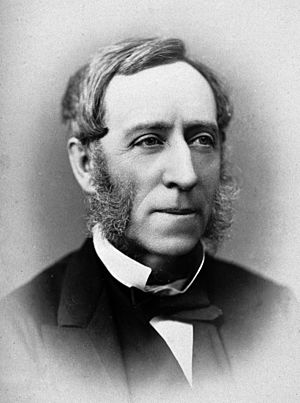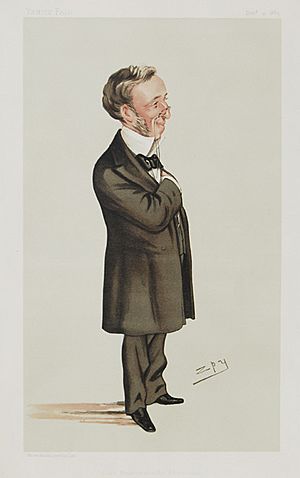Richard Quain (Irish physician) facts for kids
Quick facts for kids
Sir
Richard Quain
|
|
|---|---|

Sir Richard Quain in 1881
|
|
| Born | 30 October 1816 |
| Died | 13 March 1898 (aged 81) |
| Nationality | Irish |
| Alma mater | University College, London |
| Occupation | Physician |
| Known for | Quain's Dictionary of Medicine |
Sir Richard Quain, 1st Baronet (born October 30, 1816 – died March 13, 1898) was an important Irish doctor. He was known for his work in medicine and for writing a famous medical dictionary.
The Life of Sir Richard Quain
Sir Richard Quain was born in a place called Mallow-on-the-Blackwater in County Cork, Ireland. He later passed away in Harley Street, London, England.
He was the oldest child of John Quain and Mary Burke. For his early schooling, he went to the Diocesan School in Cloyne. When he was 15, he started training with a surgeon-apothecary (a type of doctor who also prepared medicines) in Limerick.
In 1837, Richard Quain began studying medicine at University College London. His cousins, Jones Quain and Richard Quain, were already teaching there. He finished his medical degree with honors in 1840.
He married Isabella Agnes Wray in 1854. Interestingly, he was also the great-grandfather of Ian Fleming, the famous author who created the James Bond stories!
A Doctor's Career
After his early training, Richard Quain continued his studies at University College London. He earned his M.B. degree with honors in 1840 and his M.D. (Doctor of Medicine) with a gold medal in 1842.
In 1848, he became an assistant doctor at the Royal Brompton Hospital for Chest Diseases. He worked there for many years, becoming a full doctor in 1855 and later a consulting doctor in 1875. He also worked at other hospitals, including the Seamen's Hospital in Greenwich.
Quain quickly became a very busy doctor in London. He treated many important people and was well-respected. He joined the Royal College of Physicians in 1846 and became a fellow (a senior member) in 1851. He held many important positions within this college.
In 1871, he was chosen to be a Fellow of the Royal Society, which is a very high honor for scientists. He gave a speech there about how the first sound of the heart is made.
Sir Richard Quain was asked by Queen Victoria to care for Prime Minister Benjamin Disraeli during his final days in 1881. Later, in 1890, he became a special doctor to the Queen. The next year, he was given the title of baronet, which is a special honor from the Queen.
He also served on a special group called the Royal Commission on Rinderpest in 1865. This group studied a serious disease that affected cattle.
Quain's Dictionary of Medicine
One of Sir Richard Quain's most famous achievements was creating his Dictionary of Medicine. He worked on this huge project from 1875 to 1882. This dictionary was a very important book for doctors, helping them understand different diseases and treatments. It was updated and re-published several times.
 | Stephanie Wilson |
 | Charles Bolden |
 | Ronald McNair |
 | Frederick D. Gregory |


